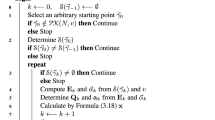Abstract
We introduce two new natural decision problems, denoted as ∃ RATIONAL NASH and ∃ IRRATIONAL NASH, pertinent to the rationality and irrationality, respectively, of Nash equilibria for (finite) strategic games. These problems ask, given a strategic game, whether or not it admits (i) a rational Nash equilibrium where all probabilities are rational numbers, and (ii) an irrational Nash equilibrium where at least one probability is irrational, respectively. We are interested here in the complexities of ∃ RATIONAL NASH and ∃ IRRATIONAL NASH.
Towards this end, we study two other decision problems, denoted as NASH-EQUIVALENCE and NASH-REDUCTION, pertinent to some mutual properties of the sets of Nash equilibria of two given strategic games with the same number of players. The problem NASH-EQUIVALENCE asks whether or not the two sets of Nash equilibria coincide; we identify a restriction of its complementary problem that witnesses ∃ RATIONAL NASH. The problem NASH-REDUCTION asks whether or not there is a so called Nash reduction: a suitable map between corresponding strategy sets of players that yields a Nash equilibrium of the former game from a Nash equilibrium of the latter game; we identify a restriction of NASH-REDUCTION that witnesses ∃ IRRATIONAL NASH.
As our main result, we provide two distinct reductions to simultaneously show that (i) NASH-EQUIVALENCE is co-\(\mathcal{NP}\)-hard and ∃ RATIONAL NASH is \(\mathcal{NP}\)-hard, and (ii) NASH-REDUCTION and ∃ IRRATIONAL NASH are both \(\mathcal{NP}\)-hard, respectively. The reductions significantly extend techniques previously employed by Conitzer and Sandholm (Proceedings of the 18th Joint Conference on Artificial Intelligence, pp. 765–771, 2003; Games Econ. Behav. 63(2), 621–641, 2008).
Similar content being viewed by others
Notes
We were inspired to study these problems by a corresponding question posed by E. Koutsoupias [14] to M. Yannakakis during his Invited Talk at SAGT 2009.
References
Abbott, T., Kane, D., Valiant, P.: On the complexity of two-player win-lose games. In: Proceedings of the 46th Annual IEEE Symposium on Foundations of Computer Sciences, pp. 113–122 (2005)
Borgs, C., Chayes, J., Immorlica, N., Tauman Kalai, A., Mirrokni, V., Papadimitriou, C.H.: The myth of the Folk theorem. Games Econ. Behav. 70(1), 34–43 (2010)
Chen, X., Deng, X., Teng, S.-H.: Settling the complexity of computing two-player Nash equilibria. J. ACM 56(3) (2009)
Codenotti, B., Stefanovic, D.: On the computational complexity of Nash equilibria for (0,1) bimatrix games. Inf. Process. Lett. 94(3), 145–150 (2005)
Conitzer, V., Sandholm, T.: Complexity results about Nash equilibria. In: Proceedings of the 18th Joint Conference on Artificial Intelligence, pp. 765–771 (2003)
Conitzer, V., Sandholm, T.: New complexity results about Nash equilibria. Games Econ. Behav. 63(2), 621–641 (2008)
Cook, S.A.: The complexity of theorem-proving procedures. In: Proceeding of the 3rd Annual ACM Symposium on Theory of Computing, pp. 151–158 (1971)
Daskalakis, C., Goldberg, P.W., Papadimitriou, C.H.: The complexity of computing a Nash equilibrium. SIAM J. Comput. 39(1), 195–259 (2009)
Etessami, K., Yannakakis, M.: On the complexity of Nash equilibria and other fixed points. SIAM J. Comput. 39(6), 2531–2597 (2010)
Fiat, A., Papadimitriou, C.H.: When players are not expectation maximizers. In: Proceedings of the 3rd International Symposium on Algorithmic Game Theory. Lecture Notes in Computer Science, vol. 6386, pp. 1–14. Springer, Berlin (2010)
Garey, M.R., Graham, R.L., Johnson, D.S.: Some \(\mathcal{NP}\)-complete geometric problems. In: Proceedings of the 8th Annual ACM Symposium on Theory of Computing, pp. 10–22 (1976)
Garey, M.R., Johnson, D.S.: Computers and Intractability—A Guide to the Theory of \(\mathcal{NP}\)-Completeness. Freeman, New York (1979)
Gilboa, I., Zemel, E.: Nash and correlated equilibria: some complexity considerations. Games Econ. Behav. 1(1), 80–93 (1989)
Koutsoupias, E.: Personal communication during the 2nd International Symposium on Algorithmic Game Theory, Paphos, Cyprus, October 2009
Mavronicolas, M., Monien, B., Wagner, K.K.: Weighted Boolean formula games. In: Proceedings of the 3rd International Workshop on Internet and Network Economics. Lecture Notes in Computer Science, vol. 4858, pp. 469–481. Springer, Berlin (2007)
McLennan, A., Tourky, R.: Simple complexity from imitation games. Games Econ. Behav. 68(2), 683–688 (2010)
Nash, J.F.: Equilibrium points in n-person games. Proc. Natl. Acad. Sci. USA 36, 48–49 (1950)
Nash, J.F.: Non-cooperative games. Ann. Math. 54(2), 286–295 (1951)
Papadimitriou, C.H.: On the complexity of the parity argument and other inefficient proofs of existence. J. Comput. Syst. Sci. 48(3), 498–532 (1994)
Author information
Authors and Affiliations
Corresponding author
Additional information
Part of the work of the first author was done while visiting University of L’Aquila, Italy and University of Cyprus, Cyprus. The second author has been partially supported by research funds at the University of Cyprus. Part of his work was done while visiting University of L’Aquila, Italy.
Rights and permissions
About this article
Cite this article
Bilò, V., Mavronicolas, M. Complexity of Rational and Irrational Nash Equilibria. Theory Comput Syst 54, 491–527 (2014). https://doi.org/10.1007/s00224-013-9523-7
Published:
Issue Date:
DOI: https://doi.org/10.1007/s00224-013-9523-7




